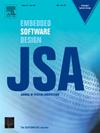BQProfit: Budget and QoS aware task offloading and resource allocation for Profit maximization under MEC platform
IF 4.1
2区 计算机科学
Q1 COMPUTER SCIENCE, HARDWARE & ARCHITECTURE
引用次数: 0
Abstract
In the era of Multi-access Edge Computing (MEC), efficient partitioning of applications and, thereafter, allocation of edge resources to the tasks of the applications is crucial for maximizing the profit of the service provider. Although a few studies have been in recent times, they overlooked many essential parameters such as the dependency on tasks, deadline and demand-based dynamic charging plan, cooperation among edge servers, etc. This paper proposes a novel strategy named BQProfit that has two essential components: a Modified Kernighan–Lin (MKL) task offloading approach and a metaheuristic-based genetic algorithm known as Cost Optimized Resource Allocation (CORA). To evaluate the effectiveness of the proposed strategy, we perform an extensive simulation using synthetic and scientific workflow data sets and compare the result with a baseline policy and two state-of-the-art policies. On average, BQProfit increases the service provider’s profit by 4.1x compared to the benchmark policies and by 1.5x compared to the best-performing benchmark policy. Our strategy also outperforms these policies by reducing task failure rates by 34.06% on average, and 25% compared to the best-performing benchmark policy. Additionally, BQProfit shows an average improvement of 70.83% over the state-of-the-art and 44% over the top-performing benchmark policy.
BQProfit:基于预算和QoS的MEC平台下利润最大化的任务卸载和资源分配
在多访问边缘计算(MEC)时代,应用程序的有效划分以及随后将边缘资源分配给应用程序的任务对于实现服务提供商的利润最大化至关重要。虽然最近有一些研究,但忽略了许多重要的参数,如对任务的依赖、基于期限和需求的动态收费计划、边缘服务器之间的合作等。本文提出了一种名为BQProfit的新策略,该策略有两个基本组成部分:一种改进的Kernighan-Lin (MKL)任务卸载方法和一种基于元启发式的遗传算法,称为成本优化资源分配(CORA)。为了评估所提出策略的有效性,我们使用综合和科学的工作流数据集进行了广泛的模拟,并将结果与基线策略和两个最先进的策略进行了比较。平均而言,与基准策略相比,BQProfit使服务提供商的利润提高了4.1倍,与性能最佳的基准策略相比,BQProfit使服务提供商的利润提高了1.5倍。我们的策略还优于这些策略,将任务失败率平均降低了34.06%,与表现最好的基准策略相比降低了25%。此外,BQProfit比最先进的政策平均提高70.83%,比表现最好的基准政策平均提高44%。
本文章由计算机程序翻译,如有差异,请以英文原文为准。
求助全文
约1分钟内获得全文
求助全文
来源期刊

Journal of Systems Architecture
工程技术-计算机:硬件
CiteScore
8.70
自引率
15.60%
发文量
226
审稿时长
46 days
期刊介绍:
The Journal of Systems Architecture: Embedded Software Design (JSA) is a journal covering all design and architectural aspects related to embedded systems and software. It ranges from the microarchitecture level via the system software level up to the application-specific architecture level. Aspects such as real-time systems, operating systems, FPGA programming, programming languages, communications (limited to analysis and the software stack), mobile systems, parallel and distributed architectures as well as additional subjects in the computer and system architecture area will fall within the scope of this journal. Technology will not be a main focus, but its use and relevance to particular designs will be. Case studies are welcome but must contribute more than just a design for a particular piece of software.
Design automation of such systems including methodologies, techniques and tools for their design as well as novel designs of software components fall within the scope of this journal. Novel applications that use embedded systems are also central in this journal. While hardware is not a part of this journal hardware/software co-design methods that consider interplay between software and hardware components with and emphasis on software are also relevant here.
 求助内容:
求助内容: 应助结果提醒方式:
应助结果提醒方式:


